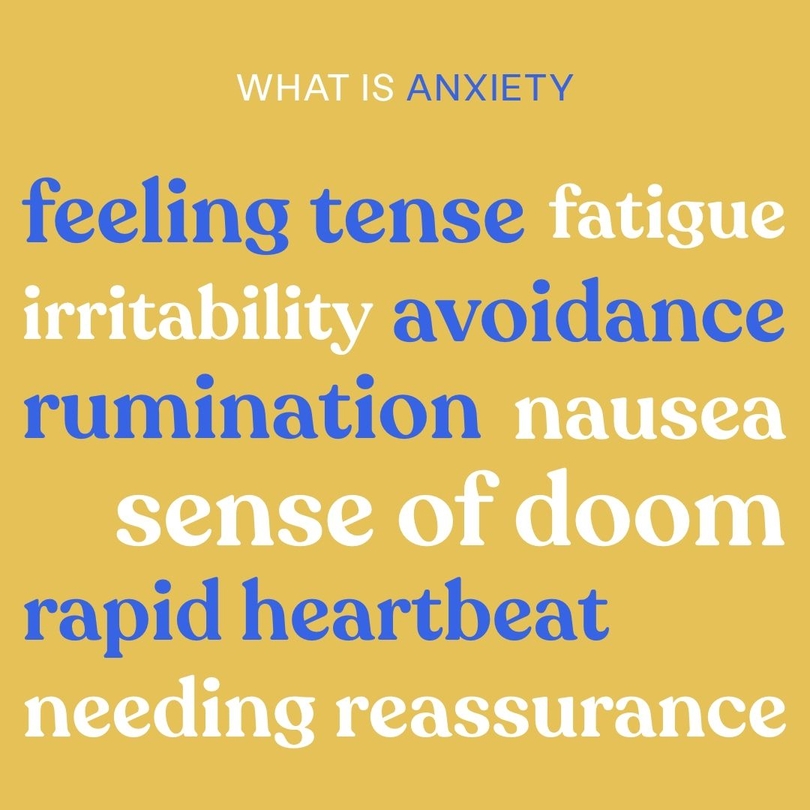What is anxiety
Anxiety is something we all experience from time to time. But how can we identify what is normal amounts of anxiety and what is above normal levels?

Dr Aneta Kotevski
September 15, 2022
5 min read
#anxiety

In this first article of our series on anxiety we are going to explore what anxiety is, how to recognise when you are experiencing it and how therapy can help.
Anxiety is something we all experience from time to time. While some anxiety is important to protect us from harm and danger, other types of anxiety can be debilitating, making it difficult to live our life normally. It can feel isolating and lonely.
Anxiety above normal levels typically affects 1 in 5 people – it's more common than you think, and without the help of therapy it can be difficult to recognise or treat by yourself.
In part 1 of this series, we will help you understand some of the emotional and physiological signs that can indicate you are suffering from anxiety.
Abnormal levels of worry
Anxiety is above a normal level when certain types of thoughts, feelings and behaviour get in the way of your everyday functioning. Some common types of unhelpful thoughts can include excessive worry about the past, present, or future. These thoughts are often expressed in the form of rumination and accompanied by unhelpful thinking styles (e.g. black and white thinking, making assumptions).
An emotional state
When a person is in an anxious state their emotions can be overwhelming and sometimes crippling. You may feel scared, frightened, isolated, or fearful to name a few. You may feel overwhelmed by a sense of doom. You will likely find yourself ruminating on thoughts of past or present events or worrying about the future. These thoughts can affect our concentration and focus and can also affect our confidence and self-esteem.
Physical symptoms
When you are experiencing anxiety there can also by physical symptoms. No one enjoys persistent fatigue, bodily tension, nausea, shortness of breath, tightness in the chest or a rapid heartbeat. Does this sound familiar? It may be a sign that you are experiencing anxiety.
Changes in behaviour
There can also be changes in your behaviour. Anxious feelings can cause you to be irritable or angry. You may want to withdraw from the world, cry, or lash out.
It is very common for one of the fight or flight responses to affect our behaviour. This is a biological response, necessary and appropriate in context of a real threat, to respond to a life-threatening situation (e.g., facing a grizzly bear in the woods). Messages from the brain automatically activates a chain of physiological events such as:
- Increased heart rate and breathing
- Dilated pupils
- Sweating
- Deactivation of digestive system
- Increased muscular tension
Flight mode
In flight mode you may show avoidance or “run away” from a real or perceived threat. When you are anxious do you feel like avoiding a family event, or taking a day off work to avoid potential conflict with someone? If you have had a serious car accident, do you now avoid riding in a car at all costs?
Fight mode
In fight mode, you may express aggression or anger towards a threat. When you feel anxious do you want to yell, or confront someone? This can feel like taking action, or ‘solving the problem’, but can result in further anxiety, fear of conflict in the future can elevate our anxiety.
Freeze mode
There is a third reaction - freeze mode. You may feel immobilised by a threat, unable to act or react.
Anxiety can be cyclic
When you feel some of the biological responses to anxiety, this may cause you to self-diagnose these responses and can contribute to your anxiety further. For example, it is easy to misinterpret fight or flight responses such as elevated heart rate as signs of impending catastrophe - “I’m having a heart attack”.
Changes to muscle tension or our digestive system may lead us to feel as though we are literally incapacitated by fear. This can have the effect of further increasing our anxiety and can be debilitating.
It may be difficult to determine where our initial feelings of anxiety start, or what triggered it. But, our own responses to how we are feeling can often further escalate our anxiety to a more severe state.
We discuss the vicious cycle of anxiety further in part 2 of this series.
Anxiety can be chronic
It is very common to become anxious about things that haven't happened yet or have already come and gone. Experiencing anxious feelings and the associated biological responses over extended periods of time can place an enormous burden on our overall well-being. It can lead to chronic anxiety - where the condition persists for extended periods of time. This can lead to depression and exacerbate other physical health issues such as chronic pain, headaches, gut problems, heart disease, diabetes, and insomnia to name a few.
How Myndful can help
If some of the feelings and behaviours covered in this article sound familiar to you, or someone close to you, we can help you to understand what is causing this. Therapy for anxiety can lead to understanding what is causing it, for you. Understanding is the first step on the path to freeing yourself from chronic anxiety. It doesn't need to rule your life.
Up next
In the next article in this series, we explore some of the different causes of anxiety.
Later in the series we will talk about how anxiety can be treated with therapy. It's important to know that anxiety is treatable. The right therapy from a qualified psychologist can help you recognise when you are suffering from anxiety and how to navigate your way out of it.
Aneta is a registered and endorsed clinical and health psychologist and AHPRA board approved supervisor in clinical and health psychology. She is also a member of the EMDR Association of Australia.